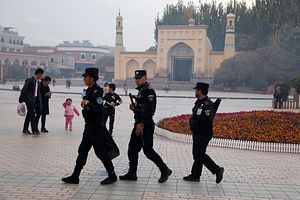After exiled Uyghur communities around the world marched in various capitals, including Brussels, Washington, DC and Ottawa, for the freedom of their countrymen, the unprecedented mass detention of Uyghurs by Chinese authorities has finally seemed to catch some attention from the West. On April 18, Acting Assistant Secretary of State Laura Stone said, according to AP’s summary, that “the U.S. was deeply concerned about China’s detention of at least ‘tens of thousands’ of ethnic Uyghurs and other human rights offenders.” She also noted, that the U.S could pursue sanctions on Chinese officials involved in the crackdown in Xinjiang under the 2016 Global Magnitsky Act.
On April 3, U.S. Senator Marco Rubio and Representative Chris Smith — the co-chairs of the Congressional-Executive Commission on China — called the camp network in Xinjiang “the largest mass incarceration of a minority population in the world today,” citing reports that “that as many as 500,000 to a million people are or have been detained.” In a letter, they asked the U.S. ambassador in China to determine whether Washington should impose sanctions against those responsible.
At the 37th session of the UN Human Rights Council, Canada also raised its concerns over the detention of thousands of Uyghurs and asked for accountability from the Chinese government.
As the news broke — from statements from local government and security officials on the ground (as reported by Radio Free Asia’s Uyghur Service), eyewitness accounts, and victim sources — the hard truth has become undeniable. Camouflaging the concentration camps that hold more than a million Uyghurs is simply not enough to hide the tragic reality that Uyghurs are facing today.
Yes, concentration camps – it is now time to label these “re-education centers” with a term that best fits the situation. According to the Britannica dictionary definition, concentration camps are “internment centers for political prisoners and members of national or minority groups who are confined for reasons of state security, exploitation, or punishment, usually by executive decree or military order.” This describes the situation in Xinjiang exactly.
China has put more than a million Uyghurs into these concentration camps, where they are held without charge or any terms of release. This has been going on for over a year now, since the arrival of new Communist Party boss of the region, Chen Quanguo, in late 2016.
Uyghurs are Turkic people and the main inhabitant of the region, their ancestral homeland for millennia. China entered the region known by Uyghurs as East Turkistan in 1949 and declared the founding of the Xinjiang Uyghur Autonomous Region on October 1, 1955. The newly-created Xinjiang accounts for one-sixth of China’s total land mass.
During nearly six decades of annexation, China has pursued a policy of assimilation and changed the demographics of the region. In 1950, the ethnic Han population (the majority group, by a massive margin, in China) accounted for only 5 percent of Xinjiang residents. That jumped to over 40 percent in 2009, including an influx to the Chinese paramilitary Xinjiang Production and Construction Corps. Uyghurs are now minorities in their own homeland.
As of 2017, the Uyghur language has been banned from schools in Hotan prefecture. In addition, a religious crackdown has morphed into a total ban of Islam, with the bold move of demolishing thousands of mosques (including “nearly 70 percent of the mosques” in Kashgar city) and the confiscation of religious books, including the Holy Quran.
China’s repression campaign gained momentum by hijacking the 9/11 tragedy. Beijing played the terrorism card against Uyghurs and intensified its crackdown by labeling all civil disobedience and discontent as part of the “three evils” (terrorism, separatism, and religious extremism). Since then, tens of thousands of Uyghurs have been sentenced to death or life imprisonment. One of them is Huseyin Celil, a Canadian citizen from Burlington, Ontario who has been serving a life sentence in a Chinese jail since 2006.
The Chinese ambition for global expansion is becoming uncontrolled, and the Uyghur homeland has become China’s springboard to Central Asia and beyond, because of its direct borders with eight countries in addition to its enormous energy resources. Xi Jinping’s ambitious “Belt and Road Initiative” looks to further cement China as the dominant power in Asia, Africa, and Europe with trade initiatives and infrastructure investment that passes through Xinjiang.
As a result, Uyghurs are seen as a barrier to Xi’s ambition. China requires the absolute silence of Uyghurs on their historic land to advance its plan. The current use of concentration camps as a tool of collective punishment of Uyghurs should be understood in this context.
Concentration camps were unanimously condemned by the world community in the last century.
The unforgettable human tragedies of Nazi concentration camps and Soviet gulags taught enough lessons for humanity to vow to prevent similar tragedies from happening again.
And yet under the eyes of the world, the Chinese government has deprived tens of thousands of Uyghurs – possible more than a million – of their basic rights by placing them in these sites.
Every single Uyghur abroad has relatives waiting for a slow death in these camps. And according to recent research, China is accelerating its drive to build more camps in the region to accommodate more Uyghurs.
Under a global march lead by World Uyghur Congress, Uyghur communities abroad are urging international action to stop this madness and to save the lives of innocent Uyghurs who are now counting their final days of isolation under physical, psychological, and spiritual torture.
Mehmet Tohti is a prominent Uyghur human rights activist living in Toronto, Canada and working as a legal professional.
































